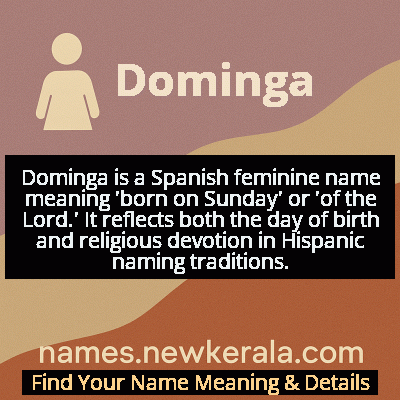Dominga Name Meaning & Details
Origin, Popularity, Numerology Analysis & Name Meaning of Dominga
Discover the origin, meaning, and cultural significance of the name DOMINGA. Delve into its historical roots and explore the lasting impact it has had on communities and traditions.
Name
Dominga
Gender
Female
Origin
Spanish
Lucky Number
9
Meaning of the Name - Dominga
Dominga is a Spanish feminine name meaning 'born on Sunday' or 'of the Lord.' It reflects both the day of birth and religious devotion in Hispanic naming traditions.
Dominga - Complete Numerology Analysis
Your Numerology Number
Based on Pythagorean Numerology System
Ruling Planet
Mars
Positive Nature
Generous, passionate, energetic, and humanitarian.
Negative Traits
Impulsive, impatient, moody, and can be overly emotional.
Lucky Colours
Red, maroon, scarlet.
Lucky Days
Tuesday.
Lucky Stones
Red coral, garnet.
Harmony Numbers
1, 2, 3, 6.
Best Suited Professions
Military, sports, philanthropy, leadership roles.
What People Like About You
Courage, energy, leadership, generosity.
Famous People Named Dominga
Dominga de la Cruz
Religious Figure
Spanish nun and mystic known for her charitable works and spiritual writings
Dominga Sotomayor
Film Director
Chilean filmmaker awarded at Cannes Film Festival for her innovative cinematic style
Dominga Gutiérrez
Educator
Pioneering educator who established schools for girls in colonial Latin America
Dominga Ortiz
Community Leader
Influential community organizer in New Mexico who preserved Hispanic cultural traditions
Name Variations & International Equivalents
Click on blue names to explore their detailed meanings. Gray names with will be available soon.
Cultural & Historical Significance
In many Hispanic communities, names like Dominga serve as cultural anchors, preserving linguistic and religious traditions across generations. The name also reflects the Spanish practice of using calendar-related names, similar to other day-of-week names like Lunes or Viernes, though Dominga remains one of the most enduring due to its sacred associations. During the colonial period, the name frequently appeared in baptismal records and religious documents, often given to girls born on Sundays or during important religious festivals. This practice reinforced the connection between personal identity and communal faith, making Dominga not just a personal name but a statement of cultural and religious belonging.
Extended Personality Analysis
Women named Dominga are often perceived as having strong, nurturing personalities with deep-rooted values. They tend to be family-oriented individuals who prioritize tradition and stability, reflecting the name's connection to religious and cultural heritage. Many Domingas exhibit natural leadership qualities combined with a compassionate nature, making them effective in caregiving roles or community positions. Their Sunday-born association often lends them an optimistic outlook and resilient spirit, as they're seen as blessed or favored.
These women typically demonstrate reliability and consistency in their relationships and professional lives, earning respect through their steadfast character. While traditional in their core values, they often balance this with practical wisdom and adaptability when facing modern challenges. The name suggests someone who serves as a moral compass for others, offering guidance rooted in experience and principle. Domingas are often described as having a calming presence and the ability to bring people together, much like how Sunday serves as a day of rest and family gathering in many cultures. Their strength lies in their ability to maintain traditions while gently guiding them into contemporary relevance.
Modern Usage & Popularity
In contemporary times, Dominga has experienced a decline in popularity among younger generations in urban areas, though it maintains strong usage in rural communities and among families emphasizing traditional Hispanic heritage. The name is currently experiencing a modest revival as part of the 'vintage name' trend, particularly among Spanish-speaking families in the United States seeking to reconnect with their cultural roots. Modern usage often pairs it with more contemporary middle names to balance tradition with modernity. While not among the top 100 names in most Spanish-speaking countries today, it remains a respected choice that conveys cultural pride and religious devotion. Digital naming trends show occasional spikes in interest around Easter and Christmas seasons, reflecting its continued religious associations. Social media and genealogy platforms have also contributed to its renewed visibility as younger generations discover family histories featuring this traditional name.
Symbolic & Spiritual Meanings
Symbolically, Dominga represents new beginnings, spiritual devotion, and the cyclical nature of time through its connection to Sunday. The name embodies the concept of resurrection and renewal, mirroring the Christian symbolism of Sunday as the first day of creation and the day of Christ's resurrection. It also carries connotations of light and illumination, as Sunday is traditionally associated with the sun and spiritual enlightenment. In metaphorical terms, Dominga suggests a person who brings light to others, serves as a moral foundation, and represents continuity between past and future. The name symbolizes the intersection of temporal and spiritual realms, connecting the weekly cycle of time with eternal spiritual truths. It represents both tradition and hope, grounding individuals in cultural heritage while pointing toward future possibilities and the perpetual renewal that each Sunday represents in the Christian calendar.

